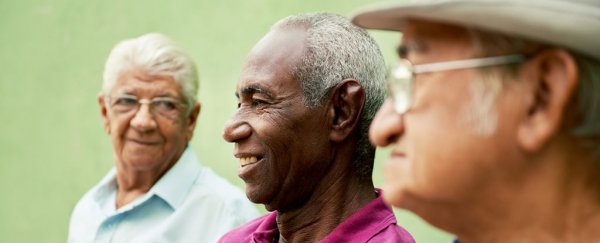People are happier and enjoy better mental health as they get older, a new study has found, so if your 20s are stressing you out right now, don't worry – better things are coming.
While previous research has found that our enjoyment of life increases as we age – something called the ageing paradox, since extra years are linked to disease and frailty – the new findings show the phenomenon occurs steadily throughout our lives from adulthood on.
A team from the University of California, San Diego examined the physical and mental health of 1,546 adults randomly selected from San Diego County, with participants being aged between 21 to 100 years old.
In terms of mental health measures – including satisfaction with life, and low levels of perceived stress, anxiety, and depression – the old appeared to win out over the young.
"Their improved sense of psychological well-being was linear and substantial," said one of the team, geriatric neuropsychiatrist Dilip Jeste. "Participants reported that they felt better about themselves and their lives year upon year, decade after decade."
In contrast with the older generations, the younger participants in the study showed higher levels of perceived stress, symptoms of depression, and anxiety – with the youngest, those aged in their 20s and 30s, having the roughest time of it.
"This 'fountain of youth' period is associated with far worse levels of psychological well-being than any other period of adulthood," said Jeste.
While many of us might assume that the increasing physical hardship of getting older would take its toll on our happiness and mental health, research indicates that this isn't necessarily the case.
"Some investigators have reported a U-shaped curve of well-being across the lifespan, with declines from early adulthood to middle age followed by an improvement in later adulthood," Jeste said. "The nadir of mental health in this model occurs during middle age, roughly 45 to 55. However, we did not find such a mid-life dip in well-being."
Instead, the data Jeste's team collected "suggest the possibility of a linear improvement in mental health beginning in young adulthood," they report in The Journal of Clinical Psychiatry.
It's not all good news though. As you might expect, the older participants did demonstrate worsened physical and cognitive functioning than the younger people in the study – which begs the question: why exactly do the old seem to enjoy their lives so much more than the young?
Researchers think the answer could lie in how we develop a new focus in life as we get older, which may help us find greater satisfaction from simple, attainable things.
"When people face endings they tend to shift from goals about exploration and expanding horizons to ones about savouring relationships and focusing on meaningful activities," ageing researcher Laura Carstensen from the Stanford Centre on Longevity, who wasn't involved with the study, told Deborah Netburn at the Los Angeles Times.
"When you focus on emotionally meaningful goals, life gets better, you feel better, and the negative emotions become less frequent and more fleeting when they occur."
Jeste suggests that the improved psychological well-being could also stem from the wisdom that comes with age, including becoming more skilled at emotional regulation and making complex social decisions.
We learn, he says, "not to sweat out the little things. And a lot of previously big things become little."
The researchers acknowledge that their study provides just a cross-sectional snapshot in time, comparing older people today to younger people today. In other words, it's not comparing generations over time, which means it doesn't take into account how, for example, young people may face greater financial or environmental stresses today than their grandparents' generation did when they were young.
But changes in the brain could also make things seem easier or less negative as we get older. A brain imaging study from 2004 found that older participants showed reduced activity in the amygdala – a region in the brain that plays a primary role in emotional reactions – when shown negative images, suggesting that emotional responses to unpleasant things may become more subdued as we age.
At this stage, there a lot of hypotheses about what's going on here, but any solid answers will require a lot more research before we can be sure why life seems to get better even as we get closer to its end.
"There's lots of speculation about why older people are happier and having better moods even when their cognitive and physical health is in decline, but we still don't have anything that fully explains what is going on," psychologist Arthur Stone from the USC Dornsife Centre for Self-Report Science, who wasn't part of the research, told the Los Angeles Times. "It's a big puzzle, and an important puzzle."
